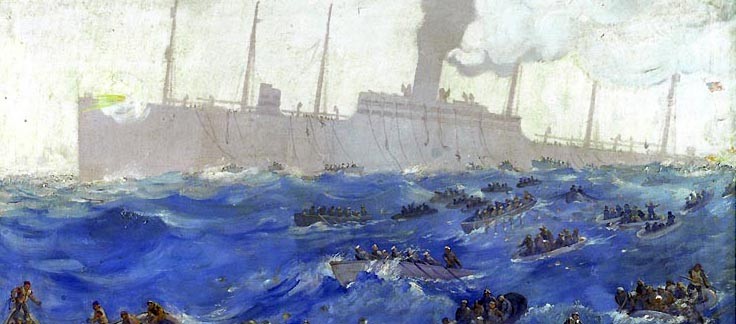
Atlantic
U-Boat Engagements: Atlantic
Six-hundred miles in her journey home after leaving Brest, France, German U-boat, U-90, torpedoed and sank troopship USS President Lincoln on May 31, 1918. Twenty-six lives were lost. Lieutenant Edouard V. M. Issacs, USN, was taken prisoner. He later received the Medal of Honor for his time in capativity.
The merchant vessel SS Westward Ho was torpedoed by U-62 on August 8, 1918 while carrying cargo between the United States and Europe. Though badly damaged, the ship made port at Brest, France. Following repairs, Westward Ho became a commissioned U.S. Navy ship and later survived service as a Japanese merchant ship during WWII.
On September 30, 1918, U-152 sank USS Ticonderoga on her way to France. Seriously wounded early in battle, Lieutenant Commander James J. Madison, USN, Ticonderoga's Commanding Officer, remained on the bridge and continued to fight the ship until she had to be abandoned. Though incapacitated by the loss of blood, he survived four days in a lifeboat. For his "exceptionally heroic service" during this action, Lieutenant Commander Madison was awarded the Medal of Honor. Only twenty-four men survived the battle. The loss was the greatest combat loss of life on any U.S. Navy ship during the war.
The last United States ship torpedoed by a German U-Boat was SS Lucia when she was hit by U-155 in the western Atlantic on October 17, 1918. Her crew was rescued by USS Fairfax. Her official data card contains the following handwritten comments, "This is the ship which was fitted with the Donnelly boxes to make her unsinkable", and "But, she was sunk! Oct. 1918." For his distinguished service in this attack, Chief Boatswain's Mate William F. O'Brien, USN, received the Navy Cross.
Image: NH 86494: USS President Lincoln, artwork of sinking, May 31, 1918. Courtesy of the Navy Art Collection. U.S. Naval History and Heritage Command.



